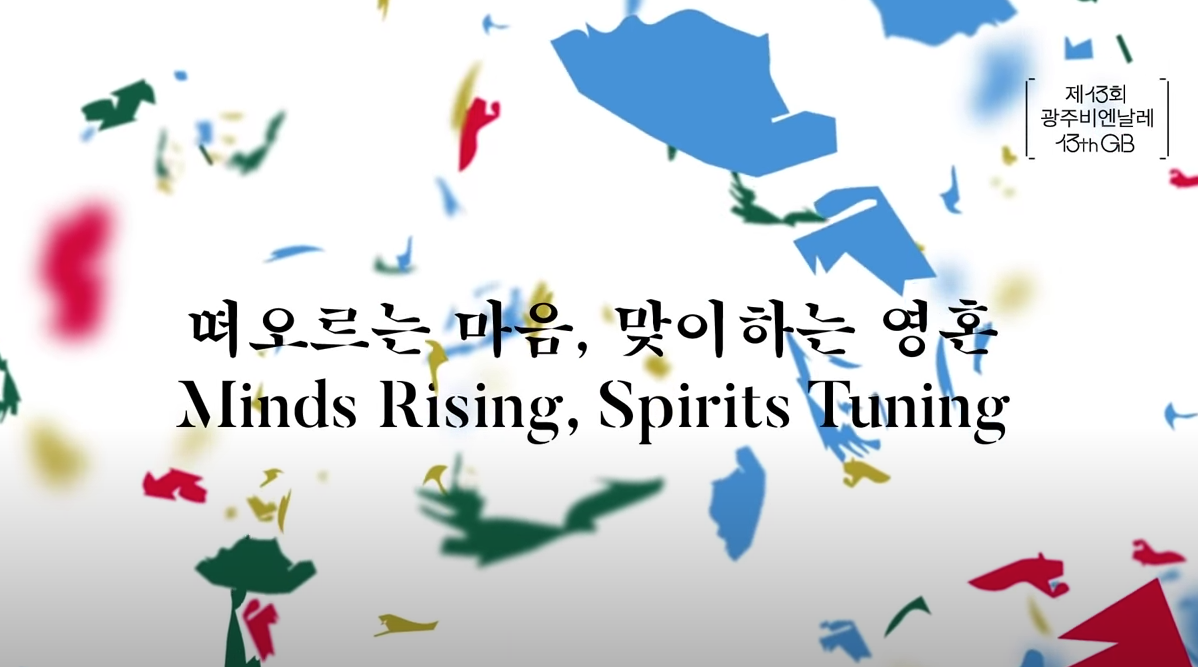Minds Rising Spirits Tuning
The 13th Gwangju Biennale
2021.04.01 ~ 2021.05.09.
2021년 4월 1일 ~ 5월 9일
장소 : 광주비엔날레 전시관, 국립광주박물관, 광주극장, 호랑가시나무 아트폴리곤
주최·주관 : (재)광주비엔날레, 광주광역시
https://13thgwangjubiennale.org/ko/
https://gwangjubiennale.org/
 [온라인전시] 광주비엔날레전시관 1관: 함께 떠오르기
[온라인전시] 광주비엔날레전시관 1관: 함께 떠오르기"함께 떠오르기"는 기념하기 위해 고안된 미학, 가상의 지형들, 모임을 구성하는 다양한 방식, 보호와 회복을 상징하는 신성한 표상 등의 스펙트럼 속으로 관객을 안내하는 하나의 프리즘으로 재구성됐다. … 다수가 함께 하는 정신을 강조하고자 비엔날레 전시관 1층을 최초로 무료 개방한다. 다양한 세대의 관중이 〈떠오르는 마음, 맞이하는 영혼〉을 되찾고, 그 안에서 순회하고, 소통할 수 있는 환경을 조성하고, 이로써 이 세계의 불안정한 상태를 인지하고 반영하는 이번 비엔날레만의 어휘와 태도를 제안하는 장을 마련하고자 한다.
It has been said that we are experiencing an intelligence explosion that is broadly understood as the emergence of superintelligence. And yet, questions abound: where precisely can organic intelligence be found? To what extent can it be pursued in the human brain and also in the heart, as the Korean term, would imply? Let us avow, then, the dissemination of the “communal mind”—continuously emergent and rooted in healing technologies, indigenous life-worlds, matriarchal systems, animism, and anti-systemic kinship.
Minds Rising, Spirits Tuning sets out to examine the spectrum of the extended mind through artistic and theoretical means. Directed by Defne Ayas and Natasha Ginwala, the 13th Gwangju Biennale (1 April–9 May, 2021) will feature a dynamic program encompassing an exhibition, a performance program, an online publishing platform and publications, and a series of public forums bringing together artists, theoretical scientists, and systems thinkers. The Biennale argues for the primacy of plurality, positing that points of origin and influence ought to be accessed not only through the dominant technological systems and machinic vocabularies traceable to the West but also relate to heterodox ancestries.
In challenging the structural divisions imposed upon corporeal, technological, and spiritual intelligence, Minds Rising, Spirits Tuning will delve into a broad set of cosmologies, activating planetary life-systems, queer technologies, and modes of communal survival. By investigating how such diverse practices transact with multitudinous forms of life, the 13th Gwangju Biennale will examine how they contend with the future horizon of cognitive capitalism and planetary imperialisms, as well as the present dimension of neural networks and other techno- spiritual emergences that populate our computational biosphere. We feel convinced—living as we are through a traumatic interregnum—that the present co-evolution with electronic intelligence and algorithmic regimes needs to be addressed from a planetary perspective. How then can we interpret the incomputable nature of this transition?
In Gwangju, a city that has long been acutely familiar with resistance building and communal trauma, it is the Biennale’s intent to bring mind-expanding practices together with historically conscious propositions. The 40th anniversary of the May 18 Democratic Uprising and people’s movement in Gwangju provides an impetus to metabolize journeys through the threshold between life and death—the middle world of the undead—to extend analyses of current strategies of solidarity building and global alliances, and to strive for a deeper understanding of the intrinsic relationship between healing, dissent, and renewal.